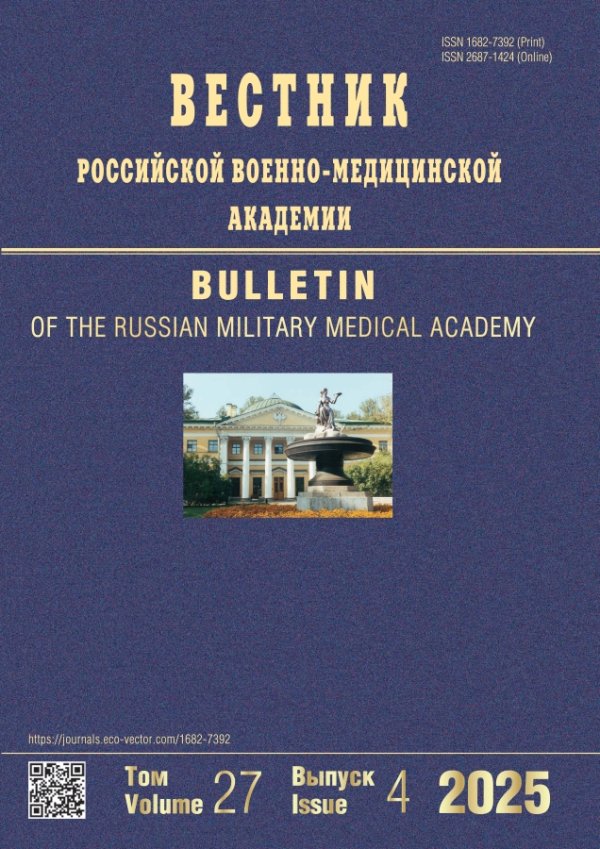Development of a methodology for obtaining physiologically complete drinking water
- Authors: Krivtsov AV1, Sorokoletova EF1, Seleznev AP1, Andrianov AI1, Andreev VP1, Ischuk Y.V1, Martinova ES1, Korneeva AA1
-
Affiliations:
- Военно-медицинская академия им. С.М. Кирова
- Issue: Vol 20, No 3 (2018)
- Pages: 133-136
- Section: Articles
- URL: https://journals.rcsi.science/1682-7392/article/view/12296
- DOI: https://doi.org/10.17816/brmma12296
- ID: 12296
Cite item
Full Text
Abstract
Full Text
##article.viewOnOriginalSite##About the authors
A V Krivtsov
Военно-медицинская академия им. С.М. Кирова
Email: vmeda-nio@mil.ru
Санкт-Петербург
E F Sorokoletova
Военно-медицинская академия им. С.М. Кирова
Email: vmeda-nio@mil.ru
Санкт-Петербург
A P Seleznev
Военно-медицинская академия им. С.М. Кирова
Email: vmeda-nio@mil.ru
Санкт-Петербург
A I Andrianov
Военно-медицинская академия им. С.М. Кирова
Email: vmeda-nio@mil.ru
Санкт-Петербург
V P Andreev
Военно-медицинская академия им. С.М. Кирова
Email: vmeda-nio@mil.ru
Санкт-Петербург
Yu V Ischuk
Военно-медицинская академия им. С.М. Кирова
Email: vmeda-nio@mil.ru
Санкт-Петербург
E S Martinova
Военно-медицинская академия им. С.М. Кирова
Email: vmeda-nio@mil.ru
Санкт-Петербург
A A Korneeva
Военно-медицинская академия им. С.М. Кирова
Email: vmeda-nio@mil.ru
Санкт-Петербург
References
- Авцын, А.П. Микроэлементозы Севера / А.П. Авцын [и др.] // Вопр. мед. географии Севера. - Мурманск, 1986. - С. 9-17.
- Азаров, И.И. Питьевая вода моряков. История и современ- ность / И.И. Азаров [и др.] // Морская медицина. - 2016. - № 3. - С. 22-31.
- ГОСТ Р 51593-2000. Вода питьевая. Отбор проб. // Государ- ственный контроль качества воды. - М.: ИПК Изд. стандар- тов, 2003. - С. 257-266.
- ГОСТ 17.1.5.05-1985. Охрана природы. Гидросфера. Общие требования к отбору проб поверхностных и морских вод, льда и атмосферных осадков // Государственный контроль качества воды. - М.: ИПК Изд. стандартов, 2003. - С. 267-278.
- ГОСТ Р 51309-99. Вода питьевая. Определение содержания элементов методами атомной спектрометрии // Государ- ственный контроль качества воды. - М.: ИПК Изд. стандар- тов, 2003. - С. 339-362.
- Государственный контроль качества воды. - М.: ИПК Изд. стандартов, 2003. - 776 с.
- Комарова, Н.В. Практическое руководство по использованию систем капиллярного электрофореза «Капель» / Н.В. Кома- рова, Я.С. Каменев. - СПб.: Веда, 2008. - 212 с.
- Кривцов, А.В. Физиолого-гигиеническая характеристика ор- ганизации питания и водоснабжения отдаленного воинского гарнизона в Арктике / А.В. Кривцов [и др.] // Вестн. Росс. воен.-мед. акад. - 2015. - № 4. (52). - С. 165-168.
- Никоноров, А.М. Гидрохимия / А.М. Никоноров. - Л.: Гидро- метеоиздат, 1989. - 351 с.
- Пат. № 2618264 Российская Федерация МПКС02F 1/68 (2006.01). Способ получения кондиционированной питье- вой воды / Селезнев А.П [и др.]; опубл. 03.05.2017. Б.И. № 13. - С. 123.
- Санитарные правила для морских судов-2018. - М.: Мор- книга, 2018. - 188 с.
- СанПиН 2.1.4.1074-01. Питьевая вода. Гигиенические требо- вания к качеству воды централизованных систем питьевого водоснабжения. Контроль качества. - М.: ФЦГСЭН Минздра- ва России, 2002. - 103 с.
- СанПиН 2.1.4.1116-02. Питьевая вода. Требования к качеству воды, расфасованной в емкости. Контроль качества. - М.: Минздрав России, 2002. - 28 с.
Supplementary files







